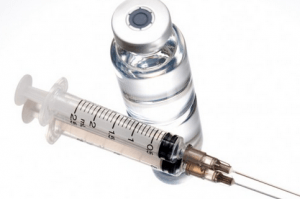Some children in Africa go without lifesaving vaccines – WHO
 One in five children on the continent still do not receive life-saving immunizations, the World Health Organisation (WHO) Regional Office for Africa and the Eastern Mediterranean Region has said.
One in five children on the continent still do not receive life-saving immunizations, the World Health Organisation (WHO) Regional Office for Africa and the Eastern Mediterranean Region has said.
It said despite considerable progress in expanding access to vaccines in Africa, one in five children still lacked access.
The WHO in a report titled: “Fulfilling a promise: Ensuring immunization for all in Africa”, was released ahead of the first-ever Ministerial Conference on Immunization in Africa slated for Addis Ababa.
The report painted mixed picture of the state of immunization among African children in the areas of vaccine access, delivery systems and immunization equity and said on the positive side, there has been some strong progress in vaccination on the continent.
Routine immunization coverage has increased considerably across Africa with average Diphtheria-Tetanus-Pertussis (DTP3) coverage increased from 57 per cent in 2000 to 80 per cent in 2014. DTP3 refers to the vaccine.
This immunization is recommended for all infants and the coverage rate of this vaccine is generally understood as the best way to measure overall immunization coverage.
Measles deaths have also declined by 86 per cent between 2000 and 2014. Because measles is a highly infectious virus, control requires more than 95 per cent coverage with two doses of Measles-containing Vaccine (MCV) across all districts.
In 2014, while the coverage of one dose of MCV in Africa was 74 per cent, coverage of two doses of MCV was only 19 per cent.
It said the introduction of new vaccines in Africa has also been a major success. The GVAP goal is on track to be met in large part due to the contribution of countries in Africa.
Many countries in Africa have introduced multiple new vaccines, such as pneumococcal conjugate vaccine and rotavirus vaccine, at the same time.
According to the report, the three critical diseases, measles, rubella, and neonatal tetanus that have been eliminated or nearly eliminated in most regions of the world, remain widespread in Africa.
In 2013, Africa was home to 45per cent of global deaths due to measles. Although the world has made significant progress against neonatal tetanus, a quarter of African countries are yet to eliminate tetanus cases, representing 13 of the 23 countries not having reached this achievement worldwide.
It said many countries have fragile health systems that have buckled under sudden crises, such as armed conflict or major disease outbreaks, adding, “These systems need to be made more resilient in order to withstand future shocks”.
Despite these achievements, the report outlined some significant challenges saying one in five children still do not receive DTP3, the most basic vaccines they needed, adding, “While DTP3 coverage throughout Africa has improved, progress in recent years has slowed”.
It also expressed concern about the serious disparities within countries, where only nine countries in Africa reported DTP3 coverage greater than 80 per cent in all districts in 2014.
Dr. Matshidiso Moeti, WHO Regional Director for Africa, said for Africa to achieve its full potential and secure a bright future, we must unite to ensure that every child on the continent receives the vaccines he or she needs to survive and thrive.
“It is unacceptable that one in five African children lack access to lifesaving vaccines, and this report is an urgent wake-up call to Africans of all walks of life and at every level”.
Dr. Kesetebirhan Admasu, Minister of Health for Ethiopia expressed concern and said, “We can and must do more to protect all our children from devastating illnesses, not only because it is our responsibility to ensure healthier futures for our citizens, but also because it is a smart economic decision”.
Dr. Nkosazana Dlamini Zuma, African Union Commission Chairperson, said “This is the start of a new era of health on our continent, in which all countries commit to saving and improving children’s lives using one of the most powerful tools ever invented: vaccines. Africa’s unity on immunization is our best hope for a better future”.
Source: GNA
